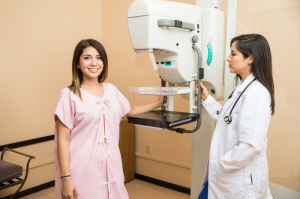por
Thomas Dworetzky, Contributing Reporter | February 10, 2017
Dense breast tissue doesn't necessarily mean that extra screenings are warranted, according to UCSF researchers.
“Not all women with dense breasts have a high-enough risk of cancer to justify supplemental screening,” lead author UCSF Professor of Medicine and Epidemiology and Biostatistics Dr. Karla Kerlikowske said.
Other research has shown that women with dense breasts run a higher risk of developing cancer. But the researchers warn against making this the only reason for doing additional exams.
The study, published May 18 in
Annals of Internal Medicine and appearing online last week, examined records of nearly 365,000 women, ranging in age from 40 to 74 years old, without a history of breast implants or cancer, and who all received regular digital mammograms.
“We found that for the vast majority of women undergoing mammography – including those with dense breasts but low five-year breast cancer risk – the chance of developing breast cancer within 12 months of a normal mammogram was low,” said Kerlikowske, adding that “women with extremely dense breasts and intermediate to high five-year breast cancer, or heterogeneously dense breasts and high five-year breast cancer risk, were at highest risk for developing breast cancer after a normal mammogram.”
The hope is that this latest study will help both patients and providers to decide on the best course of action regarding supplemental screenings.
At present, 22 states require that women be told if they have dense breast, and advise them to discuss supplemental screening options with their health care providers. “Similar legislation, which would set a minimum standard for notification and recommend that women discuss with their doctors whether further screening is necessary, is pending in Congress,” according to the UCSF statement.
The impact of such a nationwide law on millions of women, and the health care system as a whole, would be dramatic.
One issue with supplemental imaging, of course, is that while it may lead to the detection of more cancers earlier on, it can also boost the number of false-positives and unneeded biopsies.
This is a major reason for the researchers advice to consider cancer factors along with the presence of dense breasts. “Breast cancer risk should be also be taken into consideration," advised Kerlikowske, suggesting that, “the BCSC risk calculator that includes age, family history of breast cancer, history of breast biopsy, breast density and race can be used to calculate five-year breast cancer risk. Determining breast cancer risk along with knowing a woman’s breast density will optimize the identification of women with high interval cancer rates who may benefit from supplemental screening.”
Further complicating this issue, however, is a
finding by researchers that “The likelihood of a woman being told she has dense breast varies substantially according to which radiologist interprets her mammogram.”
Another study appearing in the
Annals of Internal Medicine found that 36.9 percent of the mammograms reviewed were rated as showing dense breasts, but the “proportion of mammograms assigned to those two categories by individual radiologists ranged from 6.3 percent to 84.5 percent.” The participants in the study were 83 radiologists in Pennsylvania, Vermont, New Hampshire and Massachusetts.
“Part of the message is that the assessment of dense breasts is subjective,” according to lead author Brian Sprague of the Office of Health Promotion Research at the University of Vermont in Burlington. “The paper highlights the disconnect between density laws and breast density measurement, it was never intended to be something that really dictated screening decisions.”
